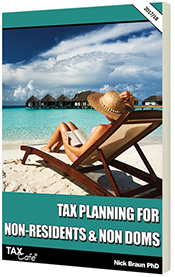Tax Planning for Non-Domiciled Individuals
How non-doms can avoid paying UK tax
MOST people living in this country have to pay tax on their UK and overseas income and capital gains.
Non-domiciled individuals (generally speaking foreign nationals who live in the UK) enjoy special tax treatment: they have to pay tax on their UK income and capital gains just like everybody else BUT they don’t have to pay tax on their overseas income and capital gains, unless the money is remitted to the UK.
Tax Guide for Non-Doms
So, for example, a non-dom can keep a pile of cash in a Swiss bank account and no tax will be payable on the interest unless it is brought back into the UK.
Actually it’s not quite as simple as this. Non-doms can only escape tax on their overseas income and gains if they have been resident here for less than 7 out of the previous 9 tax years.
The 7 year rule provides sufficient protection to overseas nationals who want to live and work in the UK for a few years. They can keep most of their assets offshore and out of HMRC’s reach.
However, many non-doms have been living in the UK for much longer – many have been here for decades.
If you are non-domiciled and have lived in the UK for 7 or more of the last 9 tax years
you can only escape tax on your overseas income and capital gains if you pay a £30,000 remittance charge.
Of course £30,000 is peanuts for the average Russian oligarch who has millions of pounds of overseas income. However, if you have, say, £50,000 of overseas income you’re not going to want to claim the remittance basis and pay a £30,000 charge for the privilege, especially since claiming the remittance basis also means you lose your income tax personal allowance and annual CGT exemption.
Non-doms in this situation can simply opt out of the remittance basis and pay tax on their worldwide income under the so-called arising basis like everybody else.
It is possible to choose the remittance basis one year (for example if you have very large overseas income or capital gains that year) and the arising basis another year.
The Under £2,000 Rule
There is one useful concession for less wealthy non-doms. Any non-domiciled individual can keep just under £2,000 per year of income and/or capital gains overseas and tax free, no matter how long they have lived in the UK.
This means a higher-rate taxpayer can save £799 per year by keeping some of their income overseas:
£1,999 x 40% tax = £799
Proposed Changes
The Government has proposed some significant changes to the tax treatment of non-domiciled individuals. They haven’t been finalised yet but are expected to be introduced from 6th April 2012.
The idea is to adopt a new carrot and stick approach by penalising non-doms who keep lots of untaxed income overseas and reward non-doms who invest in UK businesses.
The stick takes the shape of an increase in the remittance basis charge from £30,000 to £50,000 for non-doms who have been UK resident in 12 or more of the previous 14 tax years.
The carrot will be a concession allowing non-doms to remit overseas income and capital gains tax free if the money is invested in a UK business.
Tax Incentive for Business Investment
The Government proposes to allow tax-free remittances for investment in the following types of business:
- Trading businesses. These are what can loosely be described as regular businesses involved in selling goods and services, as opposed to, say businesses that earn most of their profits from investments.
- Commercial property businesses. Businesses that let commercial property are not generally treated as trading businesses. However, the Government plans to widen the scope of the new tax incentive to encourage investment in businesses that have a substantial involvement in developing or letting commercial property.
Residential Property
Businesses that hold and let residential property will be excluded from the new tax relief. However, certain types of residential property business will probably qualify:
- Businesses that build and develop residential property
- Businesses that invest in certain types of residential property where a commercial trade is carried on, e.g. nursing homes
Leasing Businesses and Personal Services
Also excluded from the new tax incentive will be businesses involved in leasing tangible moveable property (such as cars) or providing personal services (such as nannies and cooks).
Loans vs Shares
Many investments in businesses take the shape of a loan instead of a share acquisition. Tax-free remittances will be allowed to make loans to qualifying businesses as well as acquiring shares in a qualifying business.
Companies Only
The plan is to stipulate that the overseas income and gains must be invested in a company to qualify as tax-free remittances.
Partnerships, trusts and sole traders will be excluded.
The Government is currently undecided as to whether to broaden the proposed tax incentive to cover investments in AIM companies and even other listed companies.
If they do it will mean that non-doms would be able to make tax-free remittances to invest in, not just potentially risky private companies, but two more traditional types of investment that may be construed as less risky:
- Commercial property
- Stock market companies
We’ll have to wait for the draft legislation, expected some time before next year’s Budget but all in all the changes will be welcomed by many non-domiciled individuals, especially those that own businesses.





